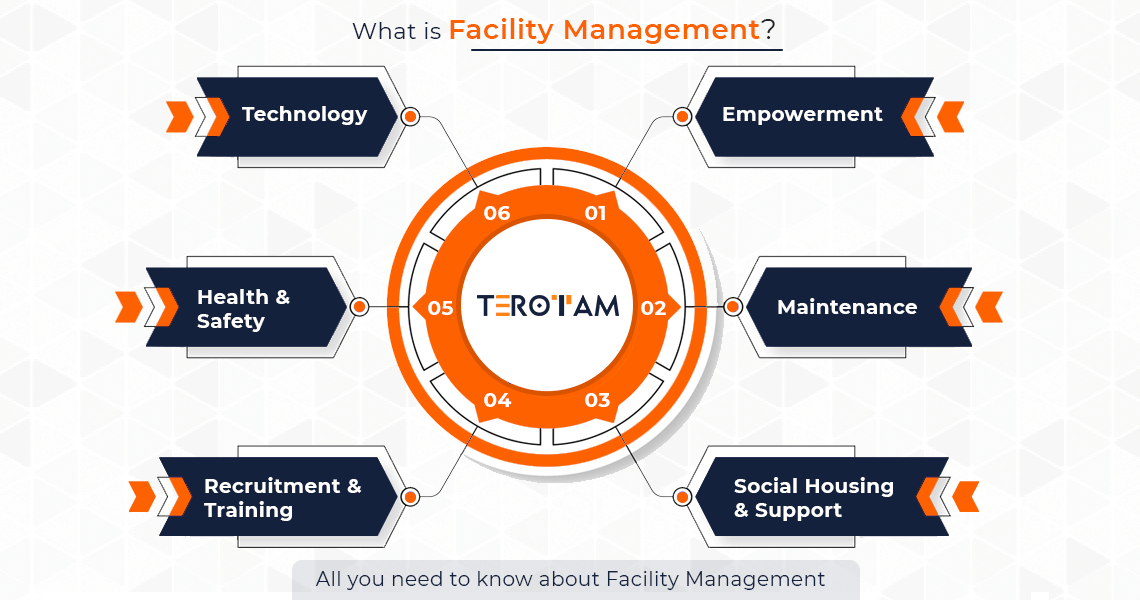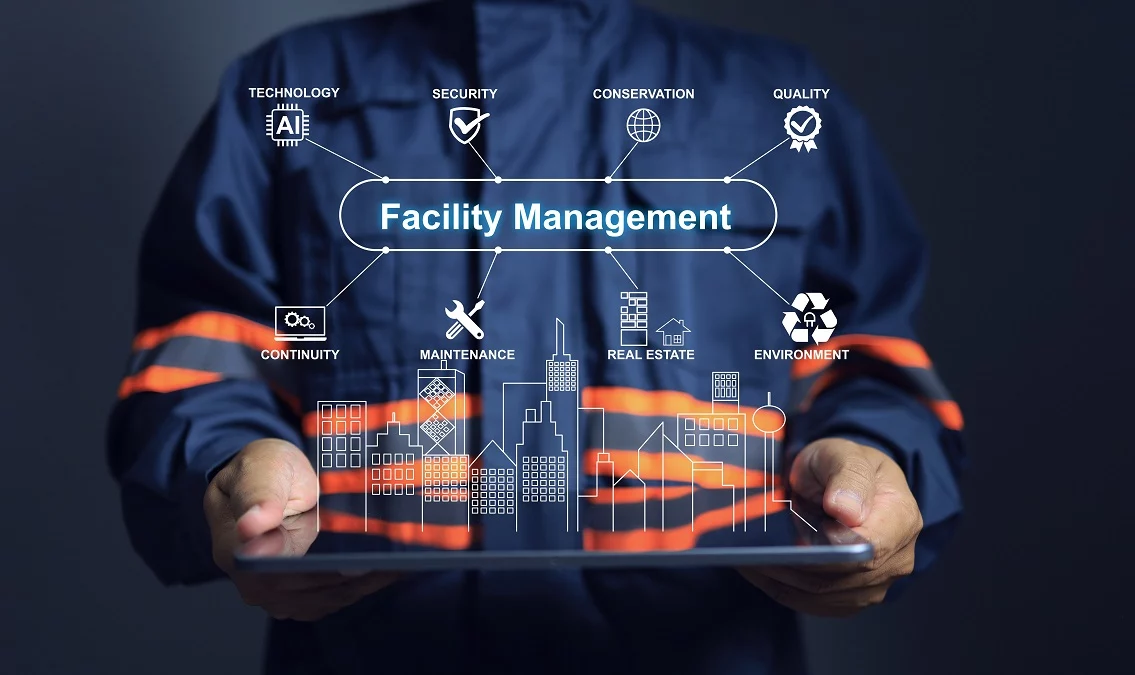Trick Patterns Shaping the Future of Center Management in 2024
As we look ahead to 2024, the landscape of facility administration is positioned for significant transformation, driven by several key trends. The integration of wise structure modern technologies and a shift towards data-driven decision-making guarantee to improve operational efficiency while prioritizing sustainability in technique.
Smart Building Technologies

Smart building modern technologies incorporate a vast selection of systems, consisting of intelligent lights, heating and cooling controls, and protection systems. By incorporating these systems, center managers can keep track of and readjust criteria in real-time, causing substantial decreases in energy waste and operational prices. For example, clever sensing units can identify occupancy degrees and adjust illumination and temperature as necessary, guaranteeing that energy is only made use of when necessary.
Moreover, these modern technologies help with enhanced information collection, enabling organizations to track usage patterns and recognize opportunities for additional improvements. The implementation of clever structure technologies not only contributes to sustainability goals yet also develops much healthier job environments that can boost worker productivity and fulfillment.
As we relocate right into 2024, the adoption of clever building technologies will likely speed up, showing a more comprehensive change in the direction of more smart, responsive, and lasting center monitoring techniques.
Data-Driven Choice Making
Progressively, companies are leveraging data-driven decision making to enhance center administration methods. By using information analytics, facility supervisors can obtain workable insights that significantly enhance operational performance and resource allowance. The assimilation of innovative innovations, such as IoT sensors and real-time tracking systems, enables the collection of vast amounts of data on structure efficiency, tenancy rates, and energy consumption.
This wealth of info allows center managers to determine trends, forecast upkeep demands, and proactively address concerns before they escalate. For example, predictive analytics can anticipate devices failures, lowering downtime and fixing costs. Furthermore, data visualization devices assist in far better communication amongst stakeholders, ensuring that informed choices are made collaboratively.
Moreover, data-driven methods improve tactical planning by enabling center supervisors to assess the efficiency of present techniques and make educated options concerning financial investments in technology or facilities. As organizations significantly focus on operational quality, data-driven choice production is poised to come to be a foundation of successful center management methods in 2024 and past. Ultimately, the ability to utilize data successfully will encourage companies to create a lot more effective, efficient, and resistant centers.
Sustainability and Environment-friendly Practices
The emphasis on data-driven decision making normally straightens with the expanding emphasis on sustainability and green methods within center management. As companies progressively prioritize ecological responsibility, facility managers are leveraging analytics to maximize resource use, decrease waste, and minimize carbon impacts. This calculated method enables the combination of energy-efficient systems, such as LED lighting, wise cooling and heating controls, and sustainable power sources right into center operations.
Additionally, the implementation of lasting methods prolongs past power consumption. Facility supervisors are advertising and taking on environmentally friendly products reusing initiatives to create a round economic situation within their facilities. This not only enhances the ecological account of the company however also promotes a culture of sustainability amongst employees.
Compliance with ecological policies is one more essential element driving the adoption of eco-friendly techniques. By making use of data analytics, center managers can keep track of compliance metrics and identify locations for renovation, making certain adherence to international and neighborhood sustainability standards.
Hybrid Work Versions
A substantial shift in the direction of crossbreed job designs is reshaping the landscape of center management in 2024. This standard incorporates remote and in-office work, necessitating a reevaluation of room usage, source allotment, and staff member engagement approaches. Organizations are significantly recognizing the value of versatile work areas that accommodate diverse demands and preferences.
Facility managers need to adjust by applying flexible office layouts that support joint my site initiatives while offering areas for concentrated job. This includes the integration of technology to facilitate seamless interaction and collaboration among in-office and remote workers. Smart structure remedies, furnished with analytics and sensors, enable real-time surveillance of room use, allowing organizations to enhance their environments effectively.
Furthermore, hybrid work models stress the requirement for effective facility administration that focuses on employee experience. This encompasses not just modern technology and area layout however likewise the growth of plans that advertise a well balanced work-life dynamic. As firms navigate this shift, the function of center monitoring comes to be pivotal in developing an active workplace that promotes productivity and drives organizational success. Fundamentally, the crossbreed work design is revolutionizing facility administration, urging an aggressive method to fulfill the developing needs of the labor force.
Boosted Passenger Wellness
As companies embrace hybrid work designs, an increased emphasis on passenger wellness is becoming indispensable to facility administration methods. Facility Management. This shift recognizes that a healthy and balanced and pleased labor force straight influences performance and retention rates. Center managers are now prioritizing environments that advertise mental and physical well-being, incorporating aspects such as all-natural illumination, biophilic style, and easily accessible wellness sources

Technology hop over to these guys plays an important role in this development. Smart building systems can keep an eye on environmental variables and adjust setups in real-time, guaranteeing ideal convenience levels - Facility Management. In addition, feedback devices, such as occupancy sensing units and worker studies, permit facility supervisors to continually refine wellness efforts based upon passenger demands.

Final Thought
In 2024, the future of facility management will be dramatically influenced by the integration of clever structure technologies and data-driven decision-making, fostering enhanced operational performance. Sustainability efforts will focus on environment-friendly methods, while the emergence of crossbreed work designs will certainly necessitate flexible workplace styles. In addition, an enhanced concentrate on resident wellness through innovative heating and cooling systems and biophilic layout will add to healthier workplace. These trends jointly emphasize the advancing landscape of facility administration in action to contemporary obstacles and possibilities.
Facility managers are advertising and adopting environmentally friendly products reusing initiatives to develop a circular economic climate within their facilities.A considerable shift towards hybrid job designs is improving the landscape of facility management in 2024.Furthermore, hybrid work models stress the demand for efficient center monitoring that focuses on staff member experience.As companies welcome hybrid work designs, an enhanced emphasis on owner health is ending up being indispensable to center management approaches.In 2024, the future of facility management will be significantly affected by the assimilation of smart building technologies and data-driven decision-making, cultivating improved operational efficiency.